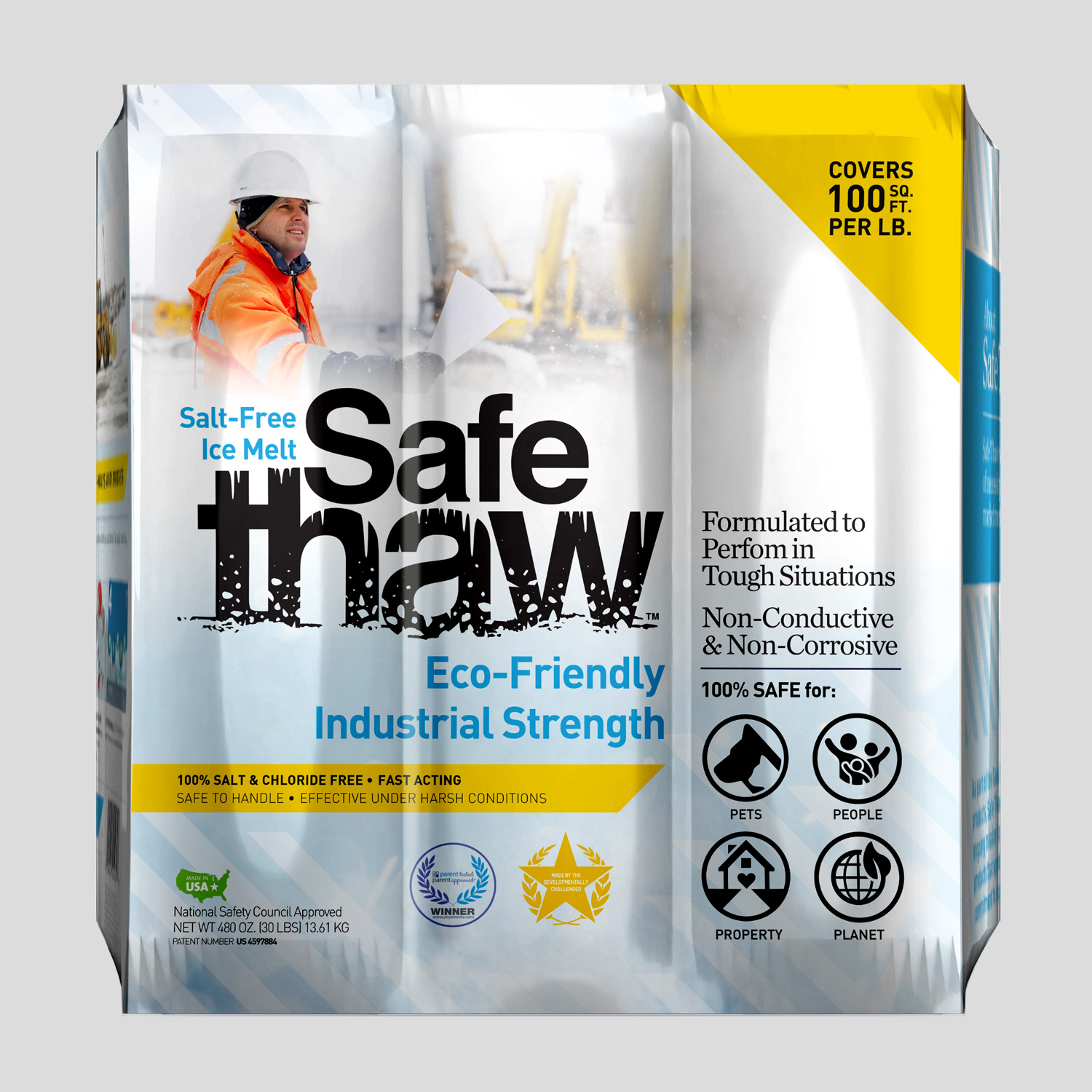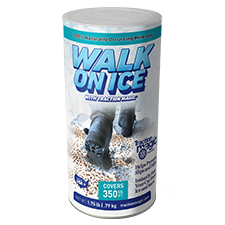Calcium Chloride And Concrete: Understanding Their Relationship

In the world of construction and maintenance, particularly concerning driveways, the relationship between calcium chloride and concrete is a subject of significant importance. This comprehensive analysis aims to explore this relationship, especially considering the usage of calcium chloride as a de-icing agent, and its impact on the longevity and integrity of concrete structures, such as driveways.

Safe Thaw
Safe Thaw was created as the ice management solution for tough winter environments. Ideal in commercial and industrial properties, shops, government agencies, bridges, and construction.
The Science Behind Calcium Chloride And Concrete Interaction
Understanding the interaction between calcium chloride and concrete is crucial for anyone involved in the construction or maintenance of concrete structures. Calcium chloride, often used for de-icing, can have profound effects on concrete surfaces.
The Chloride Dynamics At Play:
When calcium chloride comes into contact with concrete, it induces a series of chemical reactions. These reactions can lead to accelerated deterioration of the concrete, manifesting in the form of cracks, spalling, and overall weakening of the structure. This phenomenon makes the knowledge of calcium chloride and concrete interactions essential, especially when selecting the best cement for driveway.
The Impact Of De-Icing Salts On Concrete Driveways
In regions experiencing harsh winters, de-icing salts like calcium chloride are commonly used for ice control. However, their impact on concrete driveways is a matter of concern.
Understanding The Damaging Effects:
The use of de-icing salts, including calcium chloride, magnesium chloride, and potassium chloride, can lead to significant damage to concrete surfaces. These salts lower the freezing point of water, leading to freeze-thaw cycles that can be harmful to the concrete. This is an important consideration in the context of calcium chloride and concrete, as well as when choosing the best cement for driveway.
Choosing The Right Cement For Driveway Durability
When constructing a driveway, selecting the best cement for driveway becomes crucial, especially in areas where de-icing salts are used. The choice of cement can greatly influence the driveway’s resistance to the damaging effects of calcium chloride and other de-icing agents.
Factors Influencing Cement Choice
The decision on the best cement for driveway should consider the cement’s ability to withstand the harsh effects of de-icing salts. This includes looking at aspects like the cement’s composition, water permeability, and overall durability.
A Responsible Alternative To Calcium Chloride: Safe Thaw
Given the negative impacts of calcium chloride and concrete, the need for safer and more concrete-friendly de-icing solutions is evident. Safe Thaw presents itself as an ideal alternative in this regard.
Safe Thaw: Protecting Concrete From De-Icing Damage
Safe Thaw, a chloride-free and toxin-free ice melt solution, offers a safe way to manage ice on concrete surfaces without the damaging effects associated with calcium chloride. Its non-corrosive nature means it won’t harm concrete driveways or other industrial properties.
Long-Term Effectiveness And Environmental Responsibility:
Safe Thaw’s concentrated formula ensures long-term effectiveness, maintaining its ice-melting capabilities from season to season. This feature is particularly valuable in preserving the structural integrity of concrete surfaces. Additionally, its environmentally friendly formulation aligns with sustainable practices, making it a responsible choice for homeowners and industries alike.
A Patented Formula For Superior Concrete Protection:
Safe Thaw’s patented composition, which includes a modified crystalline amide core infused with glycol admixture and traction agents, provides an effective de-icing solution that is safe for concrete surfaces. This unique blend not only enhances its performance but also ensures that the issues commonly seen with calcium chloride and concrete are avoided.
The Hidden Side: CaCl2 Environmental Impact On Concrete And Beyond
So, what happens when you keep using calcium chloride on your driveway or sidewalks year after year? The truth is, the CaCl2 environmental impact isn’t limited to your concrete alone—it stretches much further. Runoff from melted snow and ice mixed with calcium chloride doesn’t just vanish. It seeps into the soil, contaminates groundwater, and can even reach local waterways. That means vegetation, aquatic life, and the overall balance of the ecosystem start to suffer.
Have you noticed patches of grass dying near your driveway edges in spring? Or perhaps shrubs that never fully bounce back after a long winter? Often, it’s not the cold—it’s the chemical residue. Calcium chloride is hygroscopic, meaning it attracts and holds moisture, which makes surrounding soil less healthy for plants. Over time, this creates barren patches and weakens the natural resilience of your landscape. When you think about it, protecting your driveway with a chloride-free option like Safe Thaw isn’t just about saving concrete—it’s about reducing collateral damage to everything around it.
Calcium Chloride Salt For Snow: Is It Worth The Trade-Off?
Now, you might be wondering: if calcium chloride is so damaging, why is it still so widely used? The answer lies in its efficiency. Calcium chloride salt for snow is fast-acting and works in extremely low temperatures, often down to -25°F. That’s why it remains a go-to for municipalities and homeowners alike.
But here’s the catch—what you gain in speed, you lose in longevity. Yes, your driveway clears quickly, but the long-term price tag is hefty: cracked concrete, corroded rebar, and an ever-growing repair bill. Add the environmental damage and health risks for pets into the mix, and suddenly the short-term convenience doesn’t feel so convenient.
Wouldn’t you rather use a product that works consistently, protects your investment, and doesn’t sabotage your garden or water supply? That’s exactly where Safe Thaw changes the game, offering ice control without the destructive side effects of calcium chloride.
Calcium Chloride vs Sodium Chloride For Melting Ice: Which Is Safer?
Let’s settle the big debate: calcium chloride vs sodium chloride for melting ice. Both are popular, but neither comes without consequences. Sodium chloride (rock salt) is cheaper, but it only works effectively at higher temperatures, usually above 15°F. It also accelerates rust on vehicles and eats away at metal fixtures, from railings to garage doors.
On the flip side, calcium chloride works faster and in colder temperatures, but it’s harsher on concrete and the environment. So, choosing between the two often feels like picking the “lesser of two evils.” And honestly, is that really a choice worth making?
The good news—you don’t have to choose between damage now or damage later. Chloride-free options like Safe Thaw break free from that cycle entirely. Instead of corroding and contaminating, they provide traction and melting power that won’t leave you with a cracked driveway or a compromised ecosystem.
Calcium Chloride Roof Melt: A Risk Above Your Head
Most people think about driveways and sidewalks when it comes to de-icing salts, but what about rooftops? Calcium chloride roof melt products are often tossed onto shingles to fight ice dams. While effective at reducing immediate ice buildup, they introduce a whole new set of problems.
Picture this: the chemicals melt ice on the roof, then drain down gutters and siding, leaving behind a corrosive trail. Over time, this weakens metal fixtures, stains exterior walls, and leaches into the foundation area. If your roof runoff connects to garden beds or soil, your landscaping pays the price, too.
And let’s not ignore safety. Residue from roof melt can drip onto walkways, creating concentrated chemical patches that speed up concrete deterioration even more. It’s like solving one problem only to create three others. That’s why choosing a chloride-free solution is not just safer for your driveway but also for every surface exposed to winter runoff.
The Smarter Shift Away From Calcium Chloride
By now, it’s clear: calcium chloride might give you quick relief from snow and ice, but it’s not a sustainable solution for your property, pets, or the planet. Whether it’s the CaCl2 environmental impact, the risks of calcium chloride salt for snow, the trade-offs in the calcium chloride vs sodium chloride debate, or the hidden dangers of calcium chloride roof melt, the long-term story is the same—damage, expense, and regret.
Switching to alternatives like Safe Thaw means you’re not choosing between efficiency and safety. You’re getting both. And the best part? You can use it without the worry of damaging your concrete, poisoning your soil, or harming the environment around you.
100% salt & chloride-free, fast acting Ice Management Solution
Conclusion
Calcium chloride has long been marketed as a quick fix for icy winters, but the bigger picture tells a different story. The environmental impact of CaCl2 stretches from cracked driveways to contaminated soil and weakened ecosystems. While calcium chloride may outperform sodium chloride in extreme cold, it comes at the cost of your property and the planet’s health. Even specialized solutions like calcium chloride roof melt create more harm than help, leaving behind corrosive residues that spread damage across multiple surfaces.
Safe Thaw, on the other hand, represents a modern shift—chloride-free, pet-safe, concrete-friendly, and environmentally responsible. Instead of managing damage year after year, you get lasting protection and peace of mind. Winter isn’t going anywhere, but how you handle it can change everything. Choosing wisely today ensures stronger concrete, safer surroundings, and a cleaner tomorrow.
Try Also Our Other Winter Safety Products:
Safe Paw
The Original and #1 Selling Pet and Child Safe Ice Melt for over 20 years. Guaranteed environmentally safe –It won’t harm animals or children, and it won’t damage your property. That’s Safe Paw. Safe Paw can change how winter affects our planet.

Walk On Ice
The handy disposable canister can be taken everywhere, with the same 100% naturally occurring minerals that provide instant traction on ice or snow. Use it on sidewalks, steps, or as an instant traction agent for your car.



